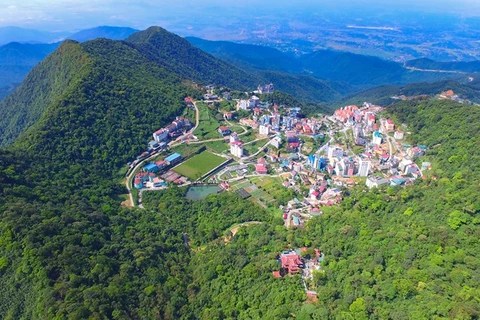Hanoi (VNS/VNA) - With the increasing development of tourism and services, working in the culinary industry offers many development opportunities and the possibility of a higher income than other occupations.
However, according to the Vietnam Chefs Association (VICA), the number of people involved in the culinary profession did not meet the current increasing demand for recruitment.
After a "frozen" period during the COVID-19 pandemic, the tourism sector was slowly recovering, mostly with the boost from domestic travel, and since late August the demand for cooking and bakery staff and chefs in restaurants, hotels, resorts and bakers had risen as the tourism industry started offering new promotion, according to Nhan dan (People) newspaper.
However, these jobs require experience as well as qualifications.
Many positions at five-star resorts need candidates who have graduated from high school and have work experience.
VICA President Nguyen Thuong Quan told the newspaper that the tourism sector needed 40,000 workers every year, of which culinary staff accounted for 8 percent.
According to figures released by the Ministry of Planning and Investment, as of late last year, there were about 540,000 restaurants, fast food outlets, cafes, bars and pubs across the country.
However, only 20-30 percent of culinary workers were professionally trained.
“The number of people trained in cookery schools is lower than those who have hands-on experience as chefs,” said Quan.
“Cooks who have done apprenticeships have limited knowledge of culinary culture, food preservation and processing methods, food hygiene and safety, and do not know about chemical additives and often guess when it comes to seasoning," Quan said.
Even those with short-term training and certificates had poor skills, Quan said.
This workforce only met the demand for assistants, not chefs, because they had only been on three to six month-cooking classes and did not have the knowledge and skills to be chefs.
Besides, most short-term cooking courses were cheap and did not provide the right equipment for students to train properly, Quan said.
For the luxury dishes with expensive ingredients, students could only learn by "observing", he added.
Although it is a country with great potential to develop culinary tourism and become "the world's kitchen", Vietnam has not yet found a way to tap its potential.
“At present, in most big hotels, the chefs are foreigners. This means they do not know the correct way to cook Vietnamese dishes perfectly,” Quan said.
“This was one of the reasons Vietnamese cuisine remained unpopular and had not become an independent tourism product,” he said.
To promote national cuisine as a tourism product, cooks are needed with experience, qualifications and knowledge of culinary culture, food processing techniques, hygiene and safety, and even medical knowledge to ensure dishes are both tasty, safe and nutritious.
Nguyen Thanh Binh, vice director of the Hotel Department at the Vietnam National Administration of Tourism, said at present some colleges and vocational training centres were offering cooking and baking classes following the Vietnam Tourism Occupational Skills Standards (VTOS).
Students were being trained in multiple skills related to various culinary fields such as Vietnamese and western dishes and cakes, said Binh.
Some training establishments such as the Saigontourist Tourism and Hotel College, Hanoi Tourism College and Pegasus College had quality facilities with experienced trainers who provided students with the knowledge and skills needed to work at high-end tourist establishments, Bình said.
"Large hotel groups had their own training systems, the staff working there were improved professionalism, matured over time, meeting the requirements of the four to five-star hotels and resorts," she said.
At present, many colleges send their students to work as interns in hotels and resorts to give the experience of a professional working environment.
“Learning in schools helps students grasp the basic knowledge of the profession, while internships in the hotel environment enrich their knowledge and give them the confidence to apply for jobs after graduation,” said Hoang Van Tung, a cooking teacher at Le Quy Don Technology College./.
VNA

























